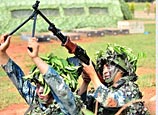
China's central bank has urged lenders to strengthen risk control and liquidity management, and said there's enough liquidity in the banking system, signaling it won't make any fund injection to ease the fund squeeze.
"At present, the overall liquidity in the banking system is at a reasonable level," the People's Bank of China said in a statement published on its website yesterday.
The central bank repeated Premier Li Keqiang's previous calls for lenders to "make active use of existing funds" to support economic development.
The PBOC also asked lenders to prudently manage liquidity risks that may result from an overly rapid credit asset growth.
"All financial institutions should... maintain credit growth at a stable and moderate level," it added.
It also urged large commercial lenders to "cooperate with the central bank to stabilize the market."
The statement was the first public comment by the central bank since interbank borrowing costs spiked to record highs in recent weeks.
The overnight Shanghai Interbank Offered Rate (Shibor), a benchmark measure of liquidity in the money market, fell for the second straight day yesterday after hitting a record high last Thursday of 13.44 percent. The overnight Shibor fixing rate shed 6.955 percentage points to 6.489 percent in the last two trading days.
A Shanghai-based analyst at Standard Chartered Bank told Shanghai Daily: "The rise in rates was partially due to some liquidity management problem at smaller lenders, and window dressing by some other lenders. But the central bank seems determined to let the banks learn how to deal with a liquidity squeeze on their own."
Shen Jun, a Shanghai-based analyst with BOC International, told AFP: "The worries (over liquidity) have now escalated to worries over a potential Chinese financial crisis."
But he stressed the central bank's stance of sitting it out in fact shows that it is taking the initiative to squeeze out bubbles from the financial system.
Zhang Zhiwei, a Hong Kong-based economist with Nomura International, said the central bank's statement suggested authorities would tolerate slowing economic growth and would not loosen credit policy. "We believe these statements suggest that the central bank's policy stance remains tight," he said.
















 Chengguan, sometimes criticized for brutal force burdened by reputation
Chengguan, sometimes criticized for brutal force burdened by reputation


![]()
